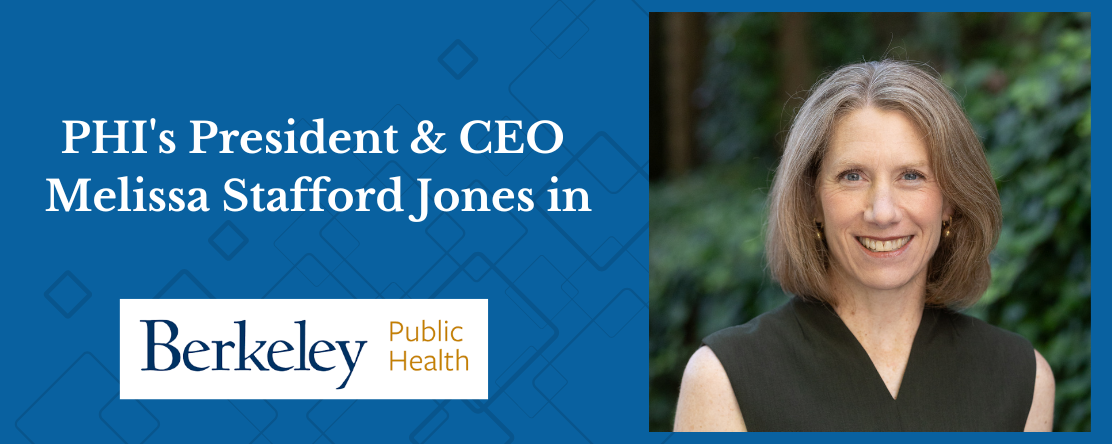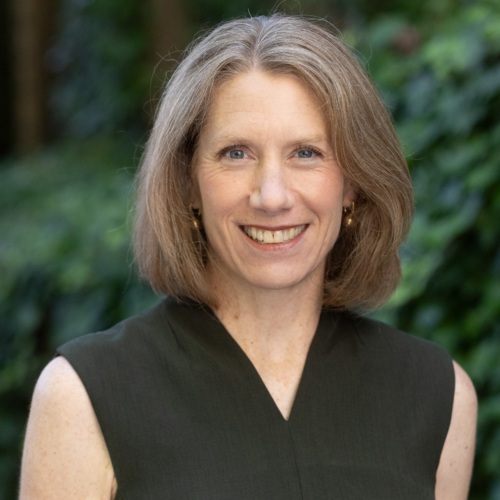
In the News
PHI’s President & CEO, Melissa Stafford Jones, Discusses Policy Approaches in Public Health, Advancing Health Equity
- UC Berkeley School of Public Health
-
Focus Areas
Capacity Building & Leadership -
Expertise
Coalition & Network Building

“After 30 years working to improve public health at the national, state and local level, UC Berkeley School of Public Health alum Melissa Stafford Jones, MPH ’95, has taken the reins of one of California’s largest and most respected non-governmental public health organizations.
It’s not surprising that the Public Health Institute’s search for a new leader ended with Stafford Jones. Since earning her masters, Stafford Jones has made a name for herself as a strong leader who can handle tough issues and work well with policymakers and stakeholders.
Stafford Jones previously served as director of the Children and Youth Behavioral Health Initiative, a project of the California Health and Human Services Agency. The five-year, $4.6 billion initiative serves as the core of California’s master plan for children’s mental health.
Previously, during the Obama Administration, she was a federal appointee for Health and Human Services Region IX—which serves serves Arizona, California, Hawaii, Nevada, American Samoa, the Northern Mariana Islands, Micronesia, Guam, the Marshall Islands, Palau, and more than 157 federally-recognized tribes including the Navajo Nation—where she worked to implement the Affordable Care Act and to increase public access to health care and social services.
Stafford Jones also served as longtime president and chief executive of the California Association of Public Hospitals and Health Systems, where she created the first large-scale pay-for-performance incentive payment program in Medicaid for California’s public safety net to improve access to care, health care quality, and health outcomes for patients, The successful program was replicated in other states.
Berkeley Public Health interviewed Stafford Jones in July, almost eight months into her new job. This is an edited transcript of our conversation:
Berkeley Public Health: What do you like about working in public health?
Melissa Stafford Jones: I have found a career in public health to be so rewarding. I’m so grateful for the opportunities I’ve had to work just completely centered on mission and on purpose. Every day, the work in public health is really an opportunity to create change, to improve health and well being. I’m just so grateful that that is what I have gotten to do every day for the last 30 years.
BPH: How did Berkeley Public Health help shape your career?
MSJ: I started my public health journey during the HIV/AIDS crisis. I still remember my application to Berkeley Public Health. I wrote my essay about how the way we define an issue results in the strategies and solutions we consider. I wanted an education in public health in order to take a comprehensive, holistic 360-degree approach—particularly looking upstream at prevention and how public policy can shape systems to improve people’s health and lives.
I knew that I wanted to work in the systems level and public policy realm; and that is what I learned at Berkeley. It was an amazing education. It was deeply rooted in community health, but also at the public policy and system levels, looking at how we create those conditions to advance health.
I worked at Contra Costa Regional Medical Center; starting off my career in county health. That experience led me to become what I call an aspirational pragmatist; to try to combine big picture aspirations for the changes we want and need to improve health and wellbeing for all people and communities.
The number one thought I would share, particularly for students interested in public policy, which I was, is to have on-the-ground experience; because that experience is essential to developing meaningful policy approaches. Policy ideas that are disconnected from the reality of what is happening in people’s lives in communities are not going to be as impactful as those which are really grounded and connected.
BPH: What are your biggest challenges in your role at PHI?
MSJ: I think both the challenge and the opportunity is to be deeply thoughtful around how it is that we advance public health and health equity in this next chapter for both public health as a field and for the Public Health Institute. There has long been a recognition of health disparities, and now a great deal of discussion and attention on equity, but we need to take it to the next level. We need to get to the structural issues that hold inequities in place.
Today, we’re thinking about what it will take for PHI to do the critical work that it does on health, health equity, and well-being for individuals and communities here in California and nationally and globally; because PHI does work in all of those settings.”
BPH: What will your priorities be?
MSJ: We know that current systems have produced the health equities that we have. And so we need to change those systems in order to change those inequities.
Part of that change is the way in which we work with the community as part of the fabric of public health. And I think that’s a place where PHI really has an opportunity to work in partnership with communities in partnership with the other components of the public health ecosystem, and really think about how we are shifting power and changing systems that hold inequities in place.
BPH: Is there a problem with public trust in healthcare and in public health, post-pandemic?
MSJ: During COVID we saw that where there was deep partnership with communities, there was trust. Where there were long-standing relationships, there was trust. That is a critical part of the public health ecosystem.
One of the structural challenges for public health, where we have important work to do as a field, is in always engaging with the communities. But we often only do it on a situational or on a disease-specific basis, where there’s funding for a very specific situation or issue.
We have an opportunity to really work on how we embed deep community engagement and partnership with communities into the way we do public health. There are a lot of folks already working on that. And I’m excited about that.
In terms of our health equity work, PHI has a long history of working to build the next generation of a more diverse workforce. We’re also thinking about new roles in the public health workforce, and engaging in cross-sector strategies and partnerships, which we know are critical to advancing equity.
Public health by its nature is an incredible field, with incredible breadth; because it recognizes that human health and well being has many contributors and facets. We have to ask, how do we work across sectors? How do we work with education? How do we work with the environmental sector and climate change? How do we work with housing? How do we work with folks working on economic justice?
BPH: In terms of public health challenges right now, how much of the solution will come down to new strategies, and how much will just come down to money?
MSJ: Interesting question. You know, it’s both. There are plenty of issues where we know what to do, and there can be a resource issue in terms of actually carrying out that body of work.
But I also think we have to keep on pushing ourselves to think about what is the next set of strategies in order to not continue to do the same things and expect different outcomes.
There’s been a recognition of the importance of social determinants of health and the need to address them in order for the medical care system to get better outcomes. We are still in the process, not only here in California, but really across the country, finding the structures, the resources and the implementation methodologies to make that real.
BPH: Tell me about your work with the Obama administration.
MSJ: What I learned and loved about that work is that you are really working with your colleagues in Washington, D.C., who are developing the policy, infrastructure and priorities of federal policy that affect people in the states.
I’ve had several roles that have allowed me to have a foot in that ‘on the ground’ reality and a foot at that 30,000-feet public policy level. For me, I have to say, I love being at that intersection.
I had the chance during my time in the Obama administration to focus on a couple of issues, in particular with implementation of the Affordable Care Act. Taking that policy and putting it into practice and supporting communities, counties, states, partners on the ground working directly with individuals and families to gain health coverage and greater access to health care. That was just a really incredible opportunity to make a difference in people’s lives that I’m grateful for.
BPH: What were some of the other issues that came up during your tenure at HHS?
MSJ: While I was there we had a significant increase in unaccompanied minors coming across the border. We had to make sure that they were met with the services and support that they needed, by working with partners in the community and in government.
BPH: How has your own thinking shifted, over time, on pressing public health challenges?
MSJ: I think what has crystallized for me through the range of experiences I have is really coming to deeply focus on and prioritize upstream prevention; change at a systems level, and working across sectors as a critical approach to making advances on challenging issues in public health.
And being very intentional about centering equity, and specifically racial equity, through authentic partnership with the community. Those were always a part of public health work. But I think my experience has really led to this crystallization of those as essential strategies that I try to bring to all of the work that I do.
And that was part of why I was so thrilled to come to PHI—because those are central to the work of PHI through a range of initiatives.”

What has crystallized for me through the range of experiences I have is really coming to deeply focus on and prioritize upstream prevention; change at a systems level, and working across sectors as a critical approach to making advances on challenging issues in public health. And being very intentional about centering equity, and specifically racial equity, through authentic partnership with the community... and that was part of why I was so thrilled to come to PHI—because those are central to the work of PHI through a range of initiatives.Melissa Stafford Jones
President & CEO, Public Health Institute
Click on the link below to read the full article.
Originally published by UC Berkeley School of Public Health
More Updates
Work With Us
You change the world. We do the rest. Explore fiscal sponsorship at PHI.
Support Us
Together, we can accelerate our response to public health’s most critical issues.
Find Employment
Begin your career at the Public Health Institute.



